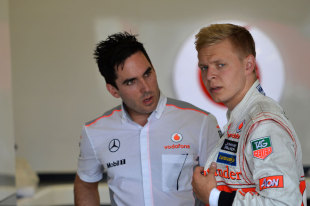- News
Top teams unlikely to run youngsters in elongated FP1

Front-running teams are unlikely to make use of longer FP1 sessions in 2014 to run young drivers, despite a two-hour first practice being agreed.
A meeting ahead of the Singapore Grand Prix saw the extension of FP1 next season provisionally agreed by the teams, with the session set to last for two hours rather than the current 90 minutes. However, Mercedes team principal Ross Brawn says the team would look to make use of the extra running with its race drivers.
"I think for us we'll still stick with race drivers," Brawn said. "One of the main changes is an extra set of tyres for the first half hour, which I think is a good move, and the ability to change drivers during a session, which is actually not easy. If you've got drivers with too much variance then it's not such an easy thing but it's doable. But it's not something that we would be considering because we need all the time in the car with our two race drivers - all the time we can get in the car with them - so I think there will be a point on the grid where it is more attractive to some teams, but certainly not for teams that are fighting for races and fighting for championships."
McLaren team principal Martin Whitmarsh agreed that it was likely such a change would be exploited by the larger teams unless the regulations were very strict.
"I think from McLaren's perspective it's not something that we'd necessarily want to do," Whitmarsh said. "I can understand the view of some - which is that it's very difficult for young drivers, there's very little testing and it's a way of encouraging them - but oddly I think it will work against the smaller teams because at the moment they have a unique opportunity to sell FP1; many do and it's a surprisingly important revenue for some of those teams.
"If every team has that opportunity then the value of what some of those smaller teams are able to sell is reduced. So oddly I think it would probably work against them. I think that you'd probably end up if it was forced - because none of the big teams would do it unless the regulations actually prescribed and required you to have a young driver or whatever the definition - frankly from our perspective you'd go to work thinking how can you use that half an hour to do aerodynamic testing.
"We would ultimately not do effectively performance testing in terms of lap time, set-up, we'd be doing a whole range of component changes and just data logging on the straights I expect. So it probably wouldn't have the desired effect, although you'd have to look at the precise detail of what they define. As is often the case, quick ideas in Formula One have unintended consequences and the teams figure it out for themselves how to exploit it to their best advantage, not necessarily aligned with the original intention of such an idea, so I think you'd have to think about it carefully."

